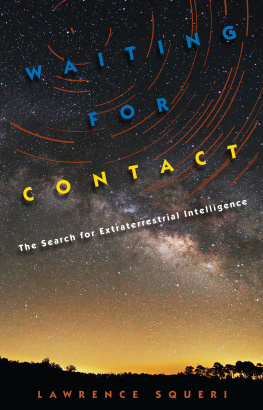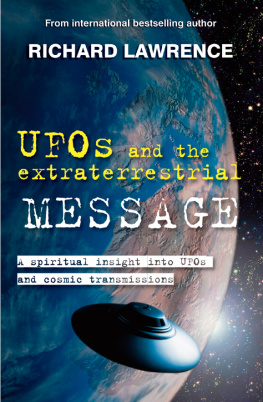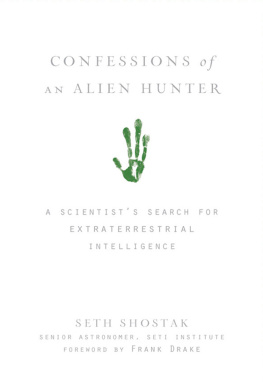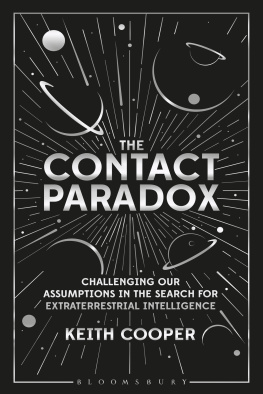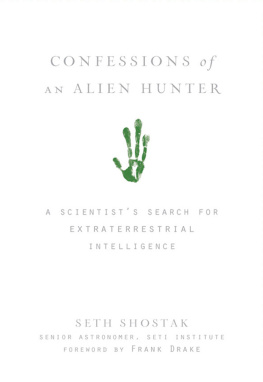Lawrence Squeri - Waiting for Contact: The Search for Extraterrestrial Intelligence
Here you can read online Lawrence Squeri - Waiting for Contact: The Search for Extraterrestrial Intelligence full text of the book (entire story) in english for free. Download pdf and epub, get meaning, cover and reviews about this ebook. year: 2016, publisher: University Press of Florida, genre: Science. Description of the work, (preface) as well as reviews are available. Best literature library LitArk.com created for fans of good reading and offers a wide selection of genres:
Romance novel
Science fiction
Adventure
Detective
Science
History
Home and family
Prose
Art
Politics
Computer
Non-fiction
Religion
Business
Children
Humor
Choose a favorite category and find really read worthwhile books. Enjoy immersion in the world of imagination, feel the emotions of the characters or learn something new for yourself, make an fascinating discovery.
- Book:Waiting for Contact: The Search for Extraterrestrial Intelligence
- Author:
- Publisher:University Press of Florida
- Genre:
- Year:2016
- Rating:3 / 5
- Favourites:Add to favourites
- Your mark:
- 60
- 1
- 2
- 3
- 4
- 5
Waiting for Contact: The Search for Extraterrestrial Intelligence: summary, description and annotation
We offer to read an annotation, description, summary or preface (depends on what the author of the book "Waiting for Contact: The Search for Extraterrestrial Intelligence" wrote himself). If you haven't found the necessary information about the book — write in the comments, we will try to find it.
Lawrence Squeri: author's other books
Who wrote Waiting for Contact: The Search for Extraterrestrial Intelligence? Find out the surname, the name of the author of the book and a list of all author's works by series.
Waiting for Contact: The Search for Extraterrestrial Intelligence — read online for free the complete book (whole text) full work
Below is the text of the book, divided by pages. System saving the place of the last page read, allows you to conveniently read the book "Waiting for Contact: The Search for Extraterrestrial Intelligence" online for free, without having to search again every time where you left off. Put a bookmark, and you can go to the page where you finished reading at any time.
Font size:
Interval:
Bookmark:

WAITING FOR CONTACT

UNIVERSITY PRESS OF FLORIDA
Florida A&M University, Tallahassee
Florida Atlantic University, Boca Raton
Florida Gulf Coast University, Ft. Myers
Florida International University, Miami
Florida State University, Tallahassee
New College of Florida, Sarasota
University of Central Florida, Orlando
University of Florida, Gainesville
University of North Florida, Jacksonville
University of South Florida, Tampa
University of West Florida, Pensacola

WAITING FOR CONTACT
The Search for Extraterrestrial Intelligence
LAWRENCE SQUERI
UNIVERSITY PRESS OF FLORIDA
Gainesville Tallahassee Tampa
Boca Raton Pensacola Orlando
Miami Jacksonville Ft. Myers Sarasota
Copyright 2016 by Lawrence Squeri
All rights reserved
Printed in the United States of America on acid-free paper
This book may be available in an electronic edition.
21 20 19 18 17 16 6 5 4 3 2 1
A record of cataloging-in-publication data is available from the Library of Congress.
ISBN 978-0-8130-6214-3
The University Press of Florida is the scholarly publishing agency for the State University System of Florida, comprising Florida A&M University, Florida Atlantic University, Florida Gulf Coast University, Florida International University, Florida State University, New College of Florida, University of Central Florida, University of Florida, University of North Florida, University of South Florida, and University of West Florida.
| University Press of Florida 15 Northwest 15th Street Gainesville, FL 32611-2079 http://www.upf.com |
book subvention provided by
Figure Foundation
decoding the inward distance
CONTENTS
PREFACE
Going to the movies when I was growing up in Astoria, New York, was always a special treat, especially if a good monster flick was the main feature. Even better than giant ants running amok were aliens from some unknown planet in distant space. Somehow they managed to land on Earth and preach to us benighted Earthlings, or in a really good movie they wreaked havoc on us backward, defenseless humans. It was so much fun, especially because it was all make-believeor was it?
The media reported sightings of flying saucers. Ordinary citizens came forward and told of meeting beings from distant worlds. What is one to believe? I could have devoted my life to examining these tales. I also realized that the quest would not pay the bills. I was drawn to something conventional: university teaching and the study of history, the focus of my doctorate from the University of Pennsylvania.
At some point in my lifeI do not remember whenI became aware that a number of astronomers were searching for extraterrestrial intelligence. Although scattered around the world, these astronomers were mostly American and their common effort is known as SETI, the Search for Extraterrestrial Intelligence. Curious about extraterrestrials, the SETI astronomers were hoping that extraterrestrials were also curious. They aimed radio telescopes to the heavens, hoping that extraterrestrials were beaming radio messages to other worlds, and perhaps to ours. Although wrapped in modern technology, their curiosity is as old as human history. I soon realized, though, that the SETI quest is only partially the satisfaction of curiosity. SETI is multidimensional, a search for answers to questions humans have asked over the ages.
SETI excited me, and this work is the result.
A few acknowledgments are in order. My loving wife, Linda, has shown much patience during my research and writing. East Stroudsburg University awarded me two sabbaticals that gave me much leisure time for reading and research. The librarians at the universitys Kemp Library did their usual professional job in assisting me. My research assistant, Monika Ackerman, was very efficient and enthusiastic. Jason Steinbrecher also helped me in my research.
I would also like to acknowledge the late John Billingham, who graciously shared his SETI memories. Special thanks also go to Gerrit Verschuur, who answered queries and sent me chapters from his SETI manuscript, which he published in 2015. I also thank Seth Shostak and Douglas Vakoch of the SETI Institute for answering my questions.
An earlier version of some of the material in this book was originally published in the Journal of Popular Culture (2004).

WAITING FOR CONTACT

Introduction
Imagine that ET has called. He or she (assuming ET has a sex) has sent a radio message to Earth.
The astronomers and astrophysicists who have searched for extraterrestrials are elated. They have aimed radio telescopes to the stars for over fifty years, hoping to catch an alien signal. They called their quest the Search for Extraterrestrial Intelligence, or SETI. Finally, the search has ended.
Basking in their new fame, SETI scientists assure the world that the greatest event in human history has taken place. Humanity will gain knowledge and wisdom from advanced aliens, make enormous leaps in self-understanding, and perhaps save itself from its suicidal tendencies.
Why do SETI people insist that humanity gains from contacting extraterrestrials? Why believe that extraterrestrials are benevolent in the first place? Science fiction has presented numerous scenarios of evil, genocidal extraterrestrials. Is not one of these scenarios just as likely as that of the good extraterrestrial?
SETI people are optimists. They know the universe was eight billion years old when our solar system formed. They posit older worlds in our galaxy, other worlds where, as on Earth, life emerged, grew intelligent, and survived. If older extraterrestrial races had not learned to cope with lethal technologies and live in harmony, they would be extinct. ET is a survivor, living in worlds that are older, advanced, and peaceful, or so goes the SETI narrative. Carl Sagan (193496) went a step further.
But ET has not called, and the SETI community still waits.
The SETI movement was born in 1959 when Giuseppe Cocconi (19142008) and Philip Morrison (19152005) of Cornell University published their seminal article in Nature, Searching for Interstellar Communications. There they noted that the recently invented radio telescope could detect extraterrestrial radio signals. Whereas previous generations could only speculate on the existence of extraterrestrials, mid-twentieth-century humans could be proactive.
In the following decades, SETI searches were haphazard, for fulltime SETI workers have been few. After all, if ET is not heard from, SETI scientists have nothing to show for their labors. As a result, SETI scientists have spent most of their professional careers in non-SETI pursuits. Drake is noted for his measurements of Jupiters upper atmosphere. He was also director of the National Astronomy and Ionosphere Center, the formal name for Puerto Ricos Arecibo Observatory, the worlds largest radio telescope. Morrison was a pioneer in the study of gamma rays and cosmic rays.
Next pageFont size:
Interval:
Bookmark:
Similar books «Waiting for Contact: The Search for Extraterrestrial Intelligence»
Look at similar books to Waiting for Contact: The Search for Extraterrestrial Intelligence. We have selected literature similar in name and meaning in the hope of providing readers with more options to find new, interesting, not yet read works.
Discussion, reviews of the book Waiting for Contact: The Search for Extraterrestrial Intelligence and just readers' own opinions. Leave your comments, write what you think about the work, its meaning or the main characters. Specify what exactly you liked and what you didn't like, and why you think so.

